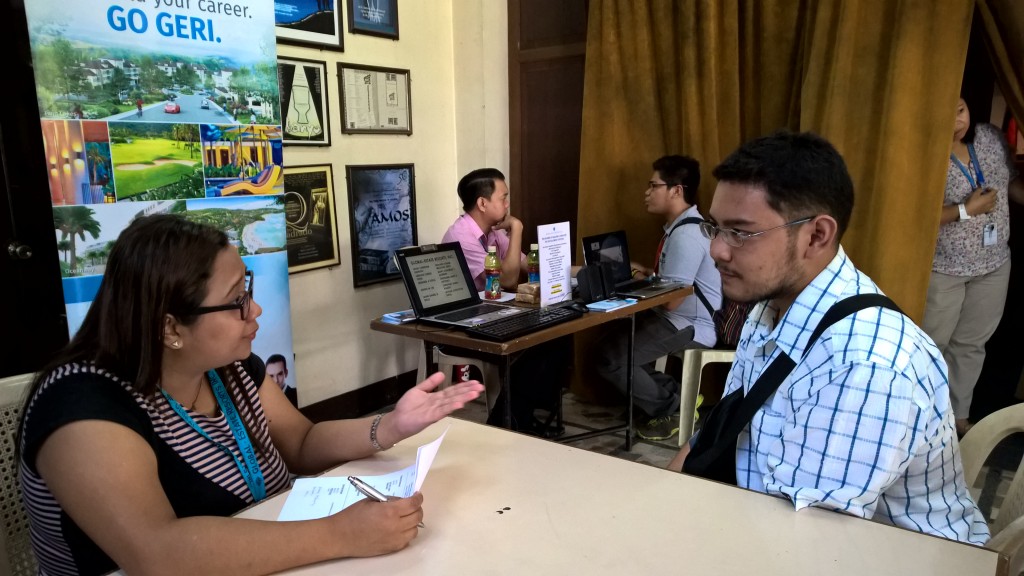Are you familiar with these interview questions?
“How do you see yourself five years from now?”
“What made you apply for our company?”
“How did you know about us?”
“Can you tell me something about yourself?”

Participating companies interview the graduates as part of ASKSonnie’s career talk for Don Bosco College Graduates
Among interview questions, these are probably one of the most familiar. Not saying that these questions have no use, of course they have, they’re just… very familiar (and common). Through these questions, the interviewer can probably see if the subject has a good vision of his/her future. The interviewer can also see if the company’s vision/mission is aligned with the one being interviewed. However, answers to these questions are easily rehearsed, like the “I-am-honest,-hardworking-and-industrious” type of rehearsed. In the end, the interview session would less likely serve its main purpose – to predict organizational behavior.
Sigmund Freud’s theory is definitely one of the most established foundations of why there is a need to do pre-employment interviews. His theory would tell us that past behavior is the best way to predict tendencies as to how a person would behave. And when we say behave in an organizational venue, we mean performance, appropriateness of conduct, diligence, and the like.
Read: How to manage employee behavior
It is very important that at least twenty minutes prior to the interview, the interviewer should study and interpret what is being written in the cover letter and resumé. Take note that the word “interpret” was used. This is to emphasize that the interviewer should not take anything written there to be exactly true. Remember that we are going to predict behavior, and not fall prey to false information. This means that if we see the words “honest, hardworking, and industrious” we do not believe that right away. We interpret.
You can get quite a good number of behavioral tendencies from these 2 documents, like:
- Written communication skills (grammar and sentence construction, use of correct terms, coherence, thought organization, emphasis of ideas, etc.)
- Skills in using basic word applications (use of indention, spacing, alignment, insertion of pictures, use bullets)
- Organizing skills (information is properly outlined and bulleted)
- Organizational skills (leadership posts in student or sub/professional organizations, involvement in task-oriented groups)
- Determination and ability to cope with difficult situations (self-supporting during studies, coming from a financially challenged household, handling challenging tasks at school or at work, etc.)
- Loyalty (number of years stayed in one company if the applicant already has working experience)
Interview questions are meant to confirm and validate the behavioral tendencies initially found during the interpretation of the resumé. It is also meant to draw out other organizational behaviors that the company needs. These are done by building up questions that would allow the interviewee to freely express or talk about the remarkable areas of his/her biographical data and experiences.
Browsing the web would lead you to a lot of articles giving you standard spills or specific interview questions. These are good too. As a matter of fact, these are really helpful. However, these questions may not apply to all organizations, and if the interviewer does not know how to use them correctly, the questions might just end up in naught. Thus, it is really important to use questions that we know how to use, how to follow-up, how to make sure that these questions align with what the organization is looking for in an applicant.
This article will share to you approaches on how to make behavioral interview questions. These are called the S-T-A-R and S-H-A-R-E model of approaches.
- S – Situations or
- T – Tasks
- A – Actions
- R – Results
- S – Situations
- H – Hindrances encountered
- A – Actions
- R – Results
- E – Evaluation of learning
In these questions, the interviewer draws out specific and actual situations or tasks given to the applicant in the past. These situations or tasks may be given directly by the interviewer, or the applicant may try to remember at least one situation to use during the interview. The interviewer then draws out the actions and the outcome or results of those actions.
One must always remember that for each situation, an organizational behavior must be drawn out. Here are some examples:
ABILITY TO HANDLE STRESS
- What has been the most stressful situation you have ever found yourself in at school or work? How did you handle it?
- What have you done in the past to prevent a situation from becoming too stressful for you or your colleagues to handle?
- When have you had to deal with an irate customer? What did you do? How did the situation end up?
ADAPTABILITY
- Tell me about a situation in which you have had to adjust to changes over which you had no control. How did you handle it?
- Tell me about a time when you had to adjust to a colleague’s working style in order to complete a project or achieve your objectives.
- How was your transition from high school to university? Did you face any particular problems? How did you handle them?
ANALYTICAL SKILLS / PROBLEM SOLVING
- Describe the project or situation that best demonstrates your analytical abilities. What was your role?
- Tell me about a time when you had to analyze information and make a recommendation. What kind of thought process did you go through? Was the recommendation accepted? If not, why?
- Tell me about a situation where you had to solve a difficult problem. What did you do? What was the outcome? What do you wish you had done differently?
- What steps do you follow to study a problem before making a decision? Why?
COMMUNICATION
- Tell me something about yourself that I cannot find here in your resumé.
- Tell me about your favorite book/movie? (Give follow-up questions to allow the applicant to express more freely)
- When have you had to present to a group of people with little or no preparation? What obstacles did you face? How did you handle them?
- Have you ever had to “sell” an idea to your co-workers? How did you do it?
INTERPERSONAL SKILLS
- Give an example of when you had to work with someone who was difficult to get along with. How/why was this person difficult? How did you handle it? How did the relationship progress?
- Describe a recent unpopular decision you made. How was it received? How did you handle it?
- Describe a situation where you had a conflict with another individual, and how you dealt with it. What was the outcome? How did you feel about it?
PLANNING / TIME MANAGEMENT
- Describe a situation that required you to do a number of things at the same time. How did you handle it? What was the result?
- How do you prioritize projects and tasks when scheduling your time? Give me some examples.
- Tell me about a project that you planned. How did your organize and schedule the tasks? Tell me about your action plan.
TEAMWORK
- Tell me about a time when you worked with a colleague who was not doing their share of the work. How did you handle it?
- Describe a situation in which you had to arrive at a compromise or help others to compromise. What was your role? What steps did you take? What was the result?
- Tell me about a time when you had to work on a team that did not get along. What happened? What role did you take? What was the result?
Discover more from ASKSonnie.INFO
Subscribe to get the latest posts sent to your email.




This reminds me that when applying for a job, you have to make a good resume and cover letter and not just copy one from the internet. This way, the HR and the interviewers will get to know you better and will even give you more chances of being hired. I like the STAR and SHARE approaches you mentioned. Very helpful for interviewers and also for those who will be applying for a job because they will know how to act and what to answer.